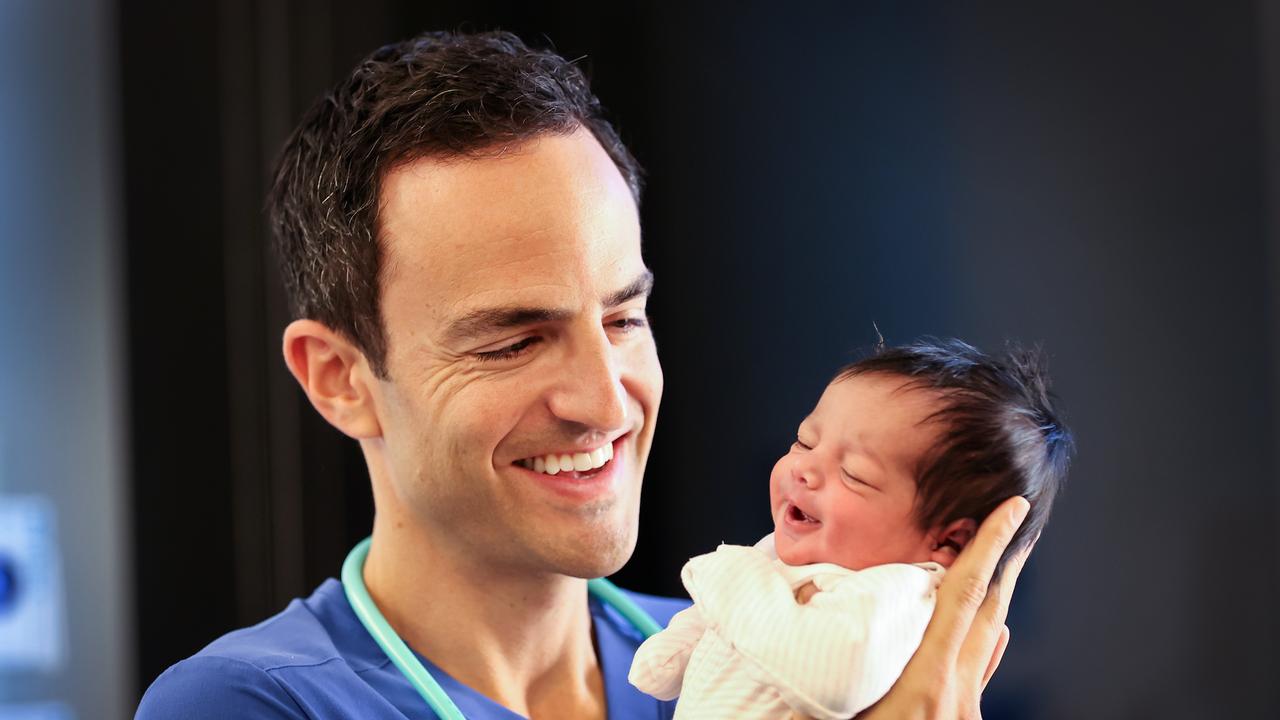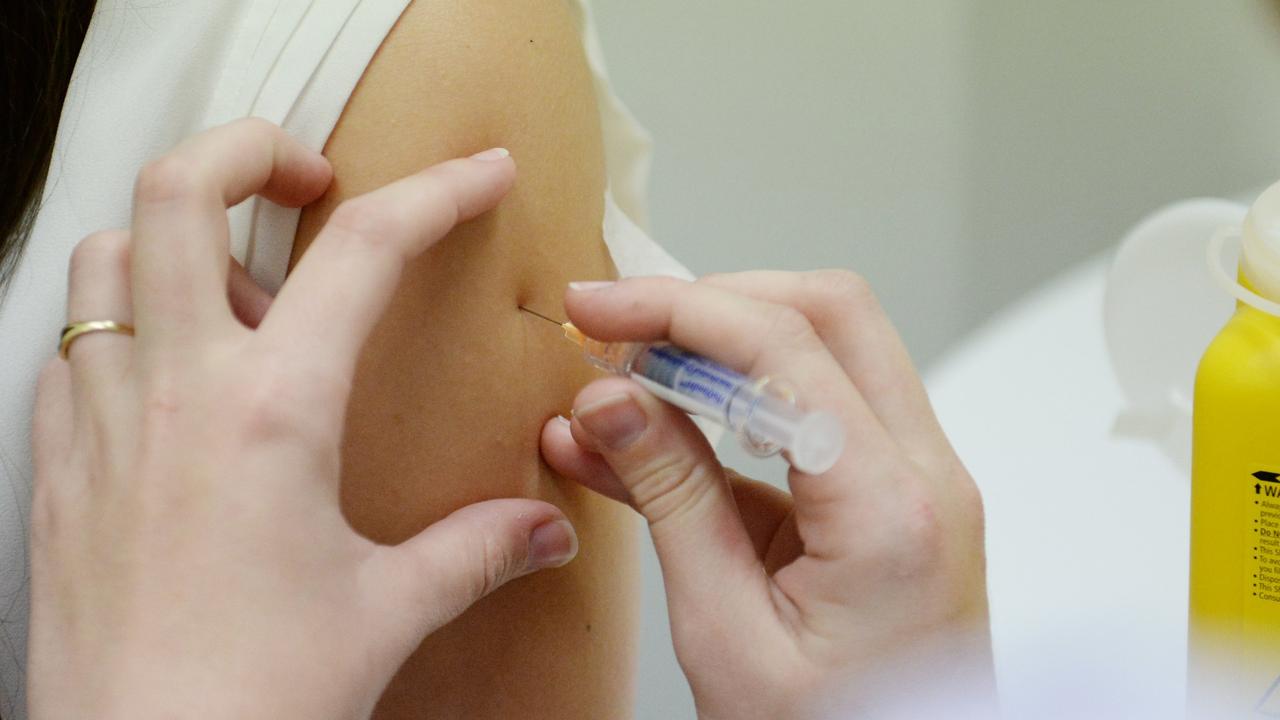Mum’s warning as flu cases surge
Hannah Casey couldn’t get out of bed for a week when she was struck down with the flu while pregnant with her fourth child. ALL YOUR FLU QUESTIONS ANSWERED

Cold & Flu
Don't miss out on the headlines from Cold & Flu. Followed categories will be added to My News.
Flu cases are climbing and experts are warning vaccine rates against the potentially deadly infection are “alarmingly low” as winter hits.
Australia has already recorded more than 92,190 laboratory-confirmed influenza infections this year.
The most-affected age group has been five to nine year olds with more than 11,970 cases, according to health department figures, followed by children aged under five.
But as of last week, only 9 per cent of kids aged five to 14 were vaccinated, and 13.9 per cent of children aged six months to four.
Just over half of Australians aged 65 and over had received their flu jab, according to the National Centre for Immunisation Research and Surveillance.
Associate Professor Michelle Tate from the Hudson Institute of Medical Research warned vaccinations are “alarmingly low” this year — but the good news is vaccinated people are up to 60 per cent less likely to get severe influenza.
She said small children were most at risk, but people aged over 65 were also of “serious concern”.
The Doherty Institute’s Professor Patrick Reading, director of the WHO Collaborating Centre for Reference and Research on Influenza, said normally flu was “very seasonal”.

“But what we’ve seen at the start of this year is higher levels of influenza activity being detected across Australia from January,” he said.
High-profile pediatrician Daniel Golshevsky — known as Dr Golly — said the potential severity of influenza was underestimated.
“We’re already seeing kids being hospitalised,” he said.

“The term flu gets thrown around quite loosely, but it is certainly not the common cold.”
He said while there was fatigue stemming from the Covid pandemic, the flu immunisation had proven safe “time and time again”.
Bellarine Peninsula mum Hannah Casey was pregnant with her fourth child when she was struck down with the flu in 2023.
She was booked in to get her vaccine but got infected first.
Ms Casey already felt “fairly sick and flat” due to her pregnancy, but realised something was wrong when she couldn’t even get dressed after a shower.
“I was so zonked — I don’t think I got out of bed for a week,” she said.
And she said she didn’t return to her pre-flu condition for about two months.
Her family was vaccinated for the 2025 flu season this week.
The kids, aged between one and seven, were distracted by chocolate and watching Bluey at the clinic.
“We talked about the vaccine giving us special superpowers so we don’t end up sick in bed like mummy did,” she said.
Associate Professor Meru Sheel from the University of Sydney’s School of Public Health said flu was “quite a severe disease”.
“We do see lots of people get hospitalised,” she said.
“As the flu season is picking up, going into definitely colder weather, there is a risk that we will see increased transmission.
“We know the flu vaccine is really good at preventing hospitalisation and deaths, and that’s why it’s really important for people to get vaccinated.”
NSW has recorded more than 34,940 cases of influenza so far this year, Queensland more than 20,280 and Victoria over 20,160.
Australia recorded more than 365,580 cases across 2024.
Internationally recognised leader in inflammation research and viral infection scientist Associate Professor Michelle Tate’s tips to stay safe
Q: When is the best time to be vaccinated?
A: A flu vaccination takes up to four weeks to work and it starts to wear off after six months. The peak of the flu season is June to August, so the optimum time to get vaccinated is around April, but anytime during flu season is a good time to receive the vaccine.
Q: Is the flu vaccine safe?
A: The vaccine does not contain live viruses and cannot cause influenza. It has a solid safety record, and has been used around the world for many decades.
Q: How does the flu vaccine work?
A: When you get a virus, your immune system builds a defence by making antibodies. If you encounter that virus again, those antibodies recognise the virus and know how to protect you from getting sick.

Q: What is in the vaccine?
A: The influenza vaccine contains proteins from the most recent flu virus and triggers your immune system to build an antibody protection. If you are exposed to that virus – your immune system recognises it and knows how to protect you.
Q: Why do I need a flu vaccine every year?
Every year, flu viruses mutate or change, so having the flu one year doesn’t protect you from getting it in the future.
A: This year’s vaccine targets two strains of influenza A and two of influenza B. Your protection is most effective for three to four months after getting vaccinated.
Q: Are there side effects to the flu vaccine?
A: The flu vaccine is made up of fragments of the virus, so it can’t cause the flu itself, but side effects include soreness and swelling where the shot was given.

Q: Why do I feel like I have the flu?
A: The immune response that is induced by the vaccine can cause low-grade flu-like symptoms which will resolve a day or two.
Q: Can flu vaccines be given with other vaccines?
A: Yes. You can get the influenza vaccine at the same time as COVID-19, respiratory syncytial virus (RSV), pneumococcal and diphtheria vaccines. This has been shown to be safe and produce a good immune response against both viruses.
Q: What are flu symptoms?
A: Flu symptoms usually start with a runny nose, sneezing and a sore throat, like a cold. However, if you have the flu, it quickly moves into headaches, fever or chills, aching muscles and joints, cough, shortness of breath, fatigue, and weakness. In some cases, vomiting and diarrhoea can occur in children.
Q: I think I’ve got the flu …
A: Contact your doctor as soon as possible. Anti-viral drugs can make the infection milder, however they need to be taken as soon as you develop symptoms to be effective.
Q: When should I go to the doctor?
A: If you experience severe symptoms or have other medical conditions, see a doctor or go to hospital.
Just like COVID-19, stay at home and limit contact with family members and others as much as possible to reduce the spread of the virus. Wear a mask when around others, cover your mouth when you sneeze and throw out used tissues. Clean and disinfect the surfaces you touch.
Q: How can I avoid catching or passing on the flu?
A: Get a flu vaccine every year. Try not to touch your eyes, nose or mouth – this is usually how the virus gets into your body.
Wash your hands regularly with soap and warm water and sneeze or cough into a tissue and throw it in the bin.
Clean and disinfect surfaces if someone at home is sick.
Importantly, if you have the flu – stay at home to avoid passing it on.
Q: What is the best way to recover?
A: For a healthy adult, your immune system will usually clear the flu virus. For the best chance of recovery, stay at home and rest.
Treatments that may help you feel better include drinking plenty of water, throat lozenges and saline nasal drops to help ease nose and throat symptoms.
Paracetamol and/or ibuprofen can lower your temperature and ease aches and pains.
See a doctor if symptoms change or become worse.
Source: Hudson Institute of Medical Research
More Coverage
Originally published as Mum’s warning as flu cases surge








